This content originally appeared on Radio Free Europe/Radio Liberty and was authored by Radio Free Europe/Radio Liberty.
This post was originally published on Radio Free.
This content originally appeared on Radio Free Europe/Radio Liberty and was authored by Radio Free Europe/Radio Liberty.
This post was originally published on Radio Free.
This content originally appeared on Radio Free Asia and was authored by Radio Free Asia.
This post was originally published on Radio Free.
This content originally appeared on Radio Free Asia and was authored by Radio Free Asia.
This post was originally published on Radio Free.
This content originally appeared on Radio Free Asia and was authored by Radio Free Asia.
This post was originally published on Radio Free.
This content originally appeared on Radio Free Asia and was authored by Radio Free Asia.
This post was originally published on Radio Free.
Candidates running in the 2024 elections in New York and Ohio accused news outlets of election interference in separate incidents in late October.
Rep. Elise Stefanik, in a post on the social media platform X, accused North Country Public Radio of “election interference” on Oct. 30, after one of its journalists posted an inaccurate report on X about the location in upstate New York where Stefanik voted early.
Stefanik, a Republican, included a screenshot of NCPR reporter Emily Russell’s post stating that the New York representative had cast her early ballot in the state’s 20th District, even though she is running for reelection in the 21st District.
Stefanik noted that the location where she cast her ballot was open to all voters in Saratoga County, and alleged that NCPR “sent out false information and spread misinformation about early voting locations in my district to suppress the vote.”
Stefanik added, “We have received calls into our office of confused voters due to this desperate election interference by an NPR affiliate.”
Stefanik also vowed, “And I will DEFUND NPR!”
NPR is partly funded by the federal government through grants from the Corporation for Public Broadcasting. Republican legislators have previously threatened to introduce legislation to cut the broadcaster’s funding due to what they described as its left-wing bias.
Russell later that day deleted the post due to what she called “a misunderstanding about the details of a polling location,” adding, “I apologize for the error.”
Stefanik and NCPR did not respond to requests for comment.
In the Ohio incident, Dawn Zinni, a candidate for recorder in Trumbull County, sued reporter David Skolnick and the Tribune Chronicle on Oct. 31, alleging that “The Tribune is a liberal Democrat publication that, with malicious intent, publicizes conservative Trump supporters like Zinni in a ‘false light,’” according to court documents reviewed by the U.S. Press Freedom Tracker.
The lawsuit described Zinni as “a Republican, a devout Christian, and a supporter of Donald J. Trump.” It accused Skolnick of “biased, discriminatory, and unbalanced” reporting on business-related lawsuits that Zinni faced, of failing to cover similar litigation faced by incumbent male Democratic officials and of openly criticizing Zinni’s Christian faith.
The suit seeks $1 million in punitive damages and $25,000 in compensatory damages.
Zinni’s attorney, Sean Logue, and the Tribune Chronicle did not reply to requests for comment.
This content originally appeared on U.S. Press Freedom Tracker: Incident Database and was authored by U.S. Press Freedom Tracker: Incident Database.
This post was originally published on Radio Free.
This content originally appeared on VICE News and was authored by VICE News.
This post was originally published on Radio Free.
This content originally appeared on Radio Free Asia and was authored by Radio Free Asia.
This post was originally published on Radio Free.
This content originally appeared on Radio Free Europe/Radio Liberty and was authored by Radio Free Europe/Radio Liberty.
This post was originally published on Radio Free.
This content originally appeared on The Real News Network and was authored by The Real News Network.
This post was originally published on Radio Free.
What you need to know
The U.S. presidential election is being keenly watched across Asia. The outcome of the race between Vice President Kamala Harris and former President Donald Trump will have a major impact on America’s relations with the region on issues like trade, security and climate change.
Radio Free Asia reporters will be gauging reactions in Asia and will regularly update this post with what we hear from regular citizens and from governments. For most part, our reporting is from countries that are under authoritarian rule.
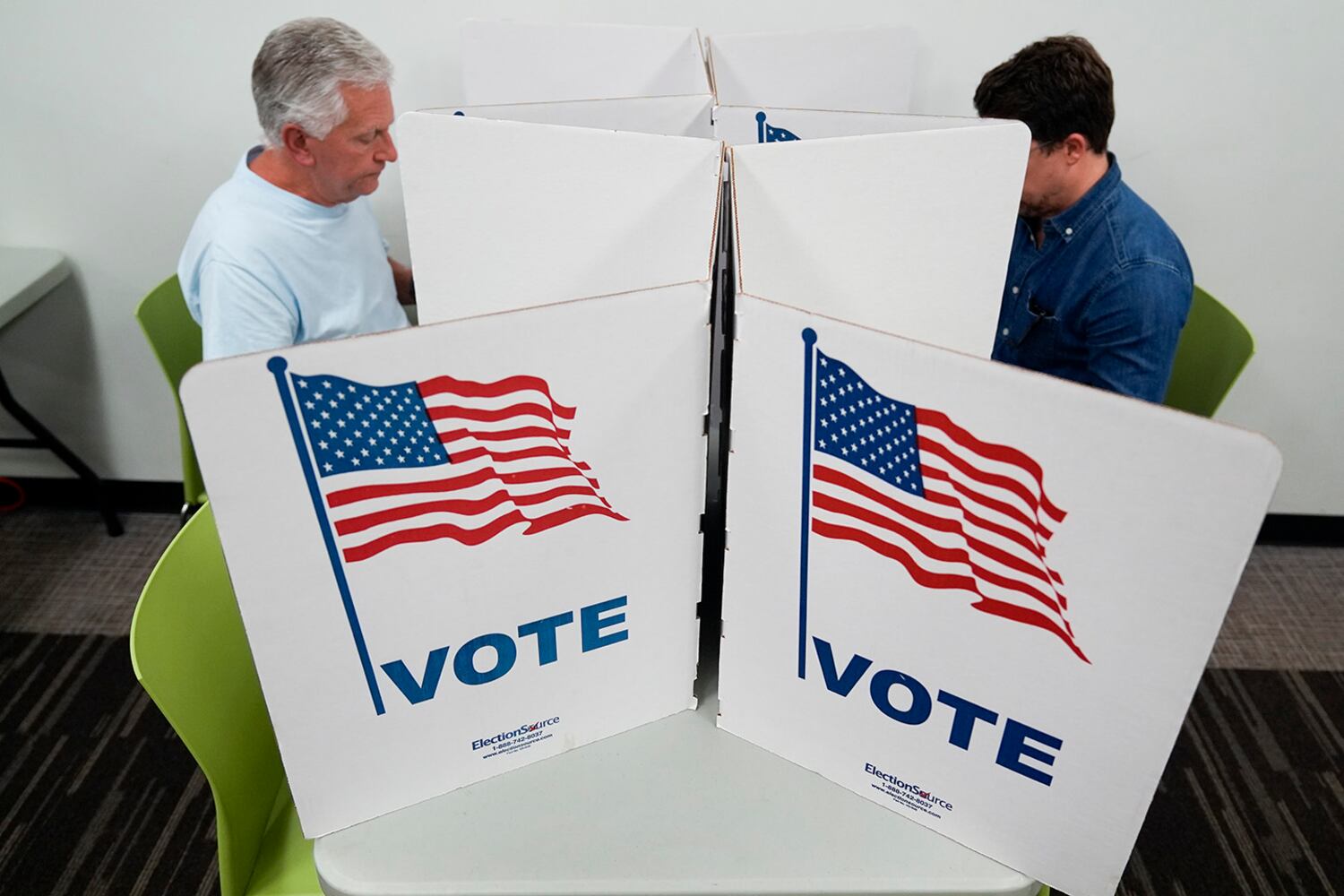
Differing approaches
Trump and Harris offer sharply different prospects for America’s engagement with Asia and the rest of the world.
Harris has campaigned mostly on continuing the Biden administration’s focus on U.S. relationships in Asia, which seeks to deftly “manage” the growing rivalry with Beijing while building tight-knit alliances with other Asian countries worried about China’s growing military might.
Trump, by contrast, has spent less time detailing an orderly approach to foreign policy to instead argue that world leaders such as Chinese President Xi Jinping and North Korea’s supreme leader Kim Jong Un respect him more than Biden or Harris, and that a personal touch will be what matters.
The two candidates also differ on trade: Trump has threatened across-the-board tariffs on all imports into the United States, including a 60% rate on Chinese imports.
Harris says that would fan inflation. She says a more targeted series of tariffs, which are intended only to shore-up U.S. production of key items like solar panels, batteries and electric cars, is more appropriate.
Posted at 4:38 p.m. Eastern on 11/5/24
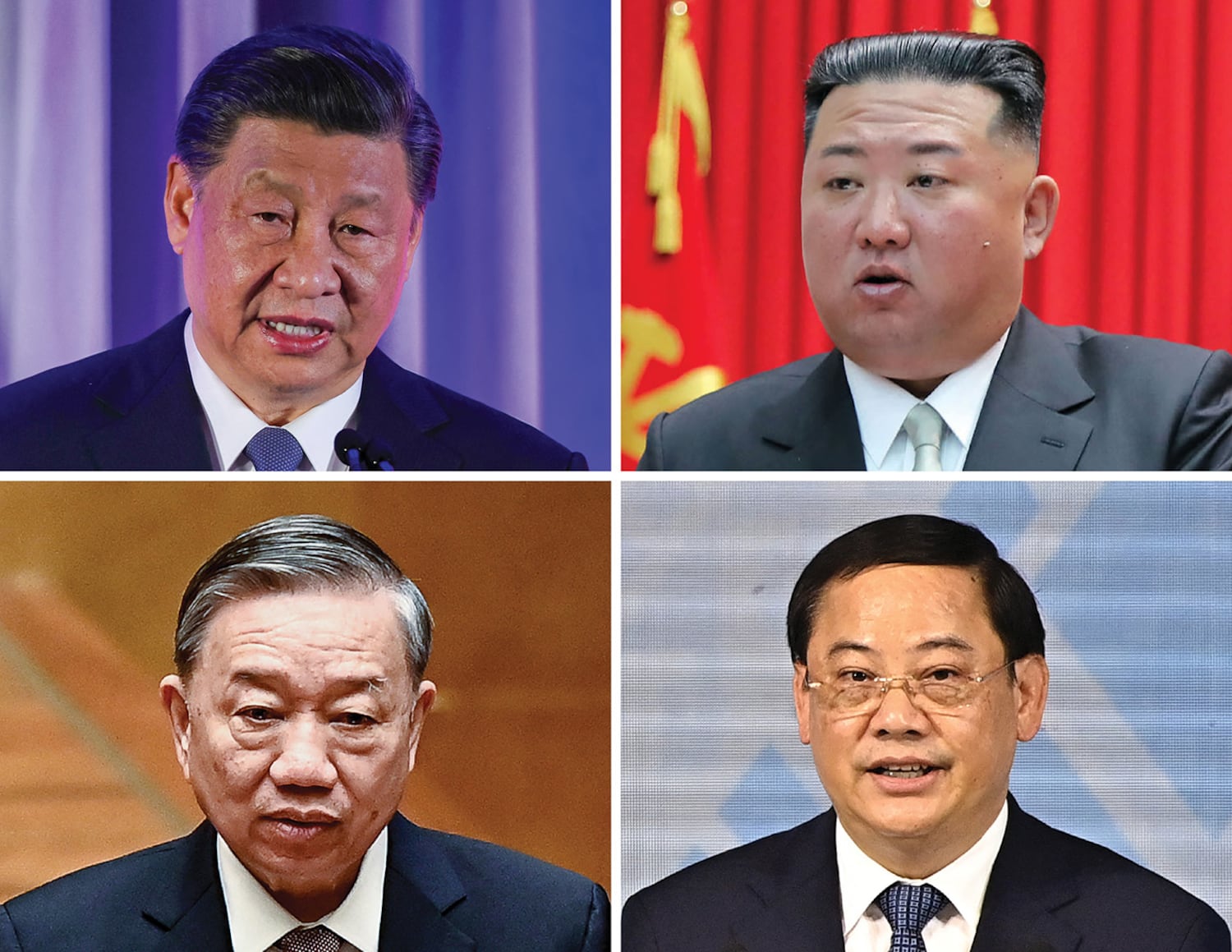
How do elections work in authoritarian Asian nations?
In a world bracing for a close U.S. presidential election result this week, a large swathe of Asia picks its leaders without suspense — and mostly with little popular participation.
Chinese President Xi Jinping was confirmed by the National People’s Congress in March 2013 with 2,952 votes for, one against, and three abstentions. Last year the rubber stamp parliament voted unanimously to give him a third term, putting him on track to stay in power for life.
North Korea’s leaders have inherited their power from father to son for three generations. They are technically “elected” – but there is no choice. In 2014, Kim Jong Un was elected to the Supreme People’s Assembly without a dissenting vote with 100% turnout.
Fellow communist states Laos and Vietnam pursue their own variations of the same Marxist-Leninist party-state model copied from the Soviet Union, with Hanoi avoiding strongman rule in favor of collective leadership.
Cambodia has been dominated by the ruling party of Hun Sen, who banned the main opposition parties in the previous two parliamentary elections.
Myanmar held a credible multi-party election in November 2020, a vote that delivered a strong majority to the National League for Democracy of de facto national leader Aung San Suu Kyi. But the military didn’t like the results and staged a coup on Feb. 1, 2021.
Posted at 5:05 pm Eastern time, 11/5/2024
Deep dive: How would Harris and Trump differ on Asia?
China focuses on threat of violent unrest as US voters head to polls
US presidential election sparks curiosity in North Korea
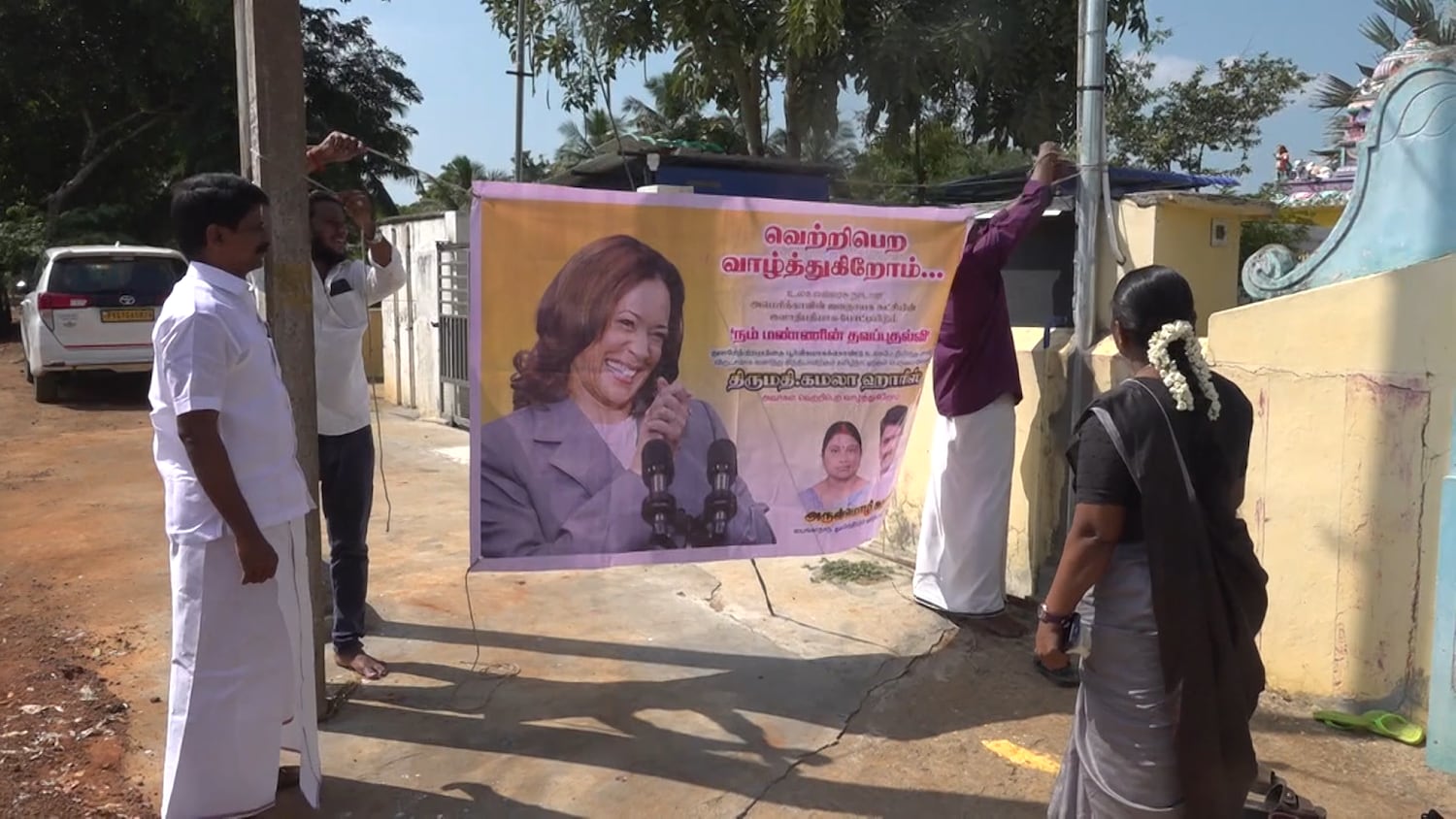
Hopes run high in Harris’ ancestral village
A tiny village located on the other side of the world in the south Indian state of Tamil Nadu is offering prayers at the local Hindu temple, hoping for victory for one of their own, Vice President Kamala Harris.
Harris, 60, was born in California to an Indian mother and Jamaican father, both of whom immigrated to the United States for higher education.
In the village of Thulasendrapuram – where Harris’s maternal grandfather Painganadu Venkataraman “P.V.” Gopalan was born – residents have been gathering each day at the village temple to offer special prayers to the Hindu deity Ayyanar – worshipped in rural parts of Tamil Nadu as a guardian or protector – to watch over Harris.
The residents refer to Harris as the “daughter of the land,” and say they feel a deep connection with her because of her ancestral ties to the village.
The village is decked out with signs featuring Harris‘s portrait and banners wishing her good luck in the election, which will determine whether or not she will become America’s first female president and first president of Indian descent.
“We in this village offer daily prayers for Kamala Harris to win the election,” Aruna Murli Sudhagar, the leader of the village, told Radio Free Asia.
Posted at 5:13 pm Eastern on 11/5/24
In Vietnam, social media platforms are abuzz about candidates Kamala Harris and Donald Trump, and at least three newspapers are asking, “Who will be elected U.S. president?”
Nguyen Binh, a farmer in the southern province of Dong Nai, expressed surprise that Americans were free to talk openly about elections. He recalled that a number of independent candidates in Vietnam’s 2016 National Assembly election are in prison.
“I only wish for one thing: that talented people in Vietnam and virtuous people in Vietnam can run for election fully, openly, and run comfortably without being coerced,” he said. “The right to self-determination belongs to the people with their votes, not from any political party.”
Independent journalist Nam Viet said he believes that the interest shown by Vietnamese demonstrates their thirst for democracy.
“The commenting, judging, choosing sides… of Vietnamese people in the U.S. election is sometimes funny, but it shows that a desire for change is still smoldering in the hearts of the nation,” he said.
“The people must be rehearsing their right to self-determination,” Nam said, saying Vietnam holds “sham” elections.
Posted at 5:34 pm Eastern on 11/5/24
This content originally appeared on Radio Free Asia and was authored by RFA Staff.
This post was originally published on Radio Free.
The result of Tuesday’s U.S. presidential election won’t impact the future of the AUKUS or Quad security arrangements that the Biden administration has pushed in the Indo-Pacific, Australia and India’s foreign ministers said in a joint press conference in Canberra.
Speaking hours before polls opened in America, Australian Foreign Minister Penny Wong and Indian External Affairs Minister S Jaishankar said they believed Vice President Kamala Harris and former President Donald Trump would continue with both security arrangements.
“We have an understanding on both sides of politics in the U.S. about the importance of AUKUS,” Wong told reporters. “In terms of the U.S. election, we will work with whomever the American people choose … for president, and also for the Congress of the day.”
“Historically, we’ve had an alliance for many, many years,” she added, “and it is a relationship that is bigger than the events of the day.”
RELATED STORIES
EXPLAINED: How would Harris and Trump differ on Asia?
US approves AUKUS defense sharing deal
China hits back at Biden’s ‘hot mic’ comment on aggression
US committed to Australia nuclear subs deal, diplomat says
Quad countries to launch joint maritime patrol activities
Wong added that Canberra saw the Quad likewise “retaining its importance regardless of the outcome of the election,” given that its four member countries share similar visions for global security.
As is hinted by its name, AUKUS ties together Australia, the United Kingdom and the United States, while the Quad is the name given to a forum involving Australia, the United States, India and Japan.
Along with the “trilateral” between the United States, Japan and Seoul, AUKUS and the Quad have been pushed by the Biden administration in its efforts to build a “patchwork” of alliances to counter China’s rising military aspirations, even if U.S. officials deny that’s its explicit aim.
‘Nasty’ Kevin Rudd
Jaishankar, the Indian external affairs minister, said Indian-U.S. ties would likewise be unchanged whoever is in the White House.
“We have actually seen steady progress in our relationship with the U.S. over the last five presidencies, including an earlier Trump presidency,” Jaishankar said. “We are very confident that whatever the verdict, our relationship with the United States will only grow.”
“In terms of the Quad, I remind you that actually the Quad was revived under a Trump presidency in 2017,” he added, noting that the group’s foreign ministers even held a rare in-person meeting during COVID in 2020, when most international meetings were being held virtually.
“That should tell you something about the prospects of it,” he said.
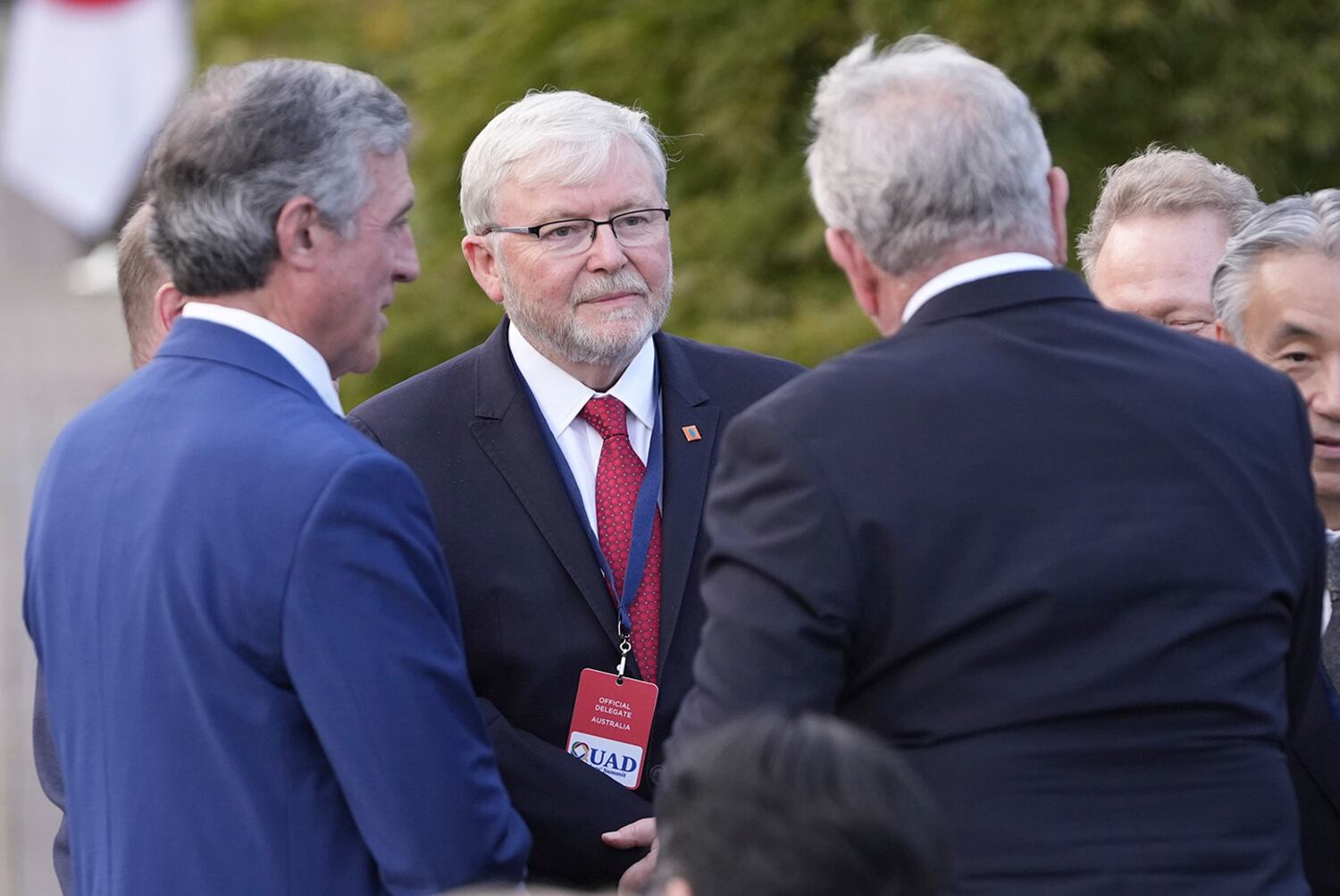
However, the prospect of a return of a Trump presidency would likely shake up U.S. alliances with its Indo-Pacific partners at least a bit.
Australia’s ambassador in Washington and two-time former prime minister, Kevin Rudd, has a testy relationship with the former president, having – prior to his current diplomatic appointment – called him “nuts,” a “traitor to the West’’ and the “most destructive president in history.”
Trump responded by labeling Rudd “nasty” and suggesting he might need to be removed as Australian ambassador if he wins.
“I don’t know much about him. I heard he was a little bit nasty. I hear he’s not the brightest bulb,” Trump told British conservative politician and broadcaster Nigel Farage on GB News in a March interview.
“If he’s at all hostile, he will not be there long,” he said.
But both Wong and Australia’s prime minister, Anthony Albanese, who served as Rudd’s deputy prime minister in 2013, have said Rudd would not be replaced as ambassador if Trump wins Tuesday’s election.
The former prime minister was doing “an excellent job” as ambassador in Washington, Wong told Australian media earlier this year.
Edited by Malcolm Foster.
This content originally appeared on Radio Free Asia and was authored by Alex Willemyns.
This post was originally published on Radio Free.
Hello, and welcome to our special Election Day edition of State of Emergency. I’m Zoya Teirstein, and today I’m reporting from rainy Buncombe County, North Carolina. I spent the morning talking to voters at the Fairview Public Library — one of 17 temporary polling sites in the county established after Hurricane Helene caused widespread damage in late September.
North Carolina is one of many states that saw record-breaking early voting in the weeks leading up to Election Day — about 50 percent of registered voters in Buncombe, more than 115,000 people, voted early, and local election officials expect a huge turnout today as well.
“The last four years have been brutal for small business. You come out of the grocery store with a couple bags and it costs you $140 and you’re going, ‘What did I get? I got taken is what I got.’”
—Robert Lund, a home remodeler in his 50s, who said he was going to vote for Donald Trump.
Polls opened at 6:30 a.m. at Fairview Public Library, with dozens of people streaming in throughout the morning. While most are in the right place, a few voters have accidentally landed in the wrong spot. “This isn’t my location,” one man called to me as he got back into his truck.
Sean Miller, a 26-year-old Democrat who lives in Fairview, lost nearly all of her worldly possessions in Helene, and the road leading out of her community was destroyed. “We were trapped for a week,” she said, stopping to talk to me after she cast her ballot. “And there was a tree in my house.” Miller was able to find her new polling location online once her power came back on.
The storm didn’t change who she planned to vote for, Miller said, but it did deepen her conviction. “I would really like to be able to keep the National Weather Service free and accessible to everyone,” she said, referencing a Project 2025 initiative to privatize federal weather data collection. “Helene didn’t change my opinion, but it made me feel more encouraged to vote to keep basic things like that.”
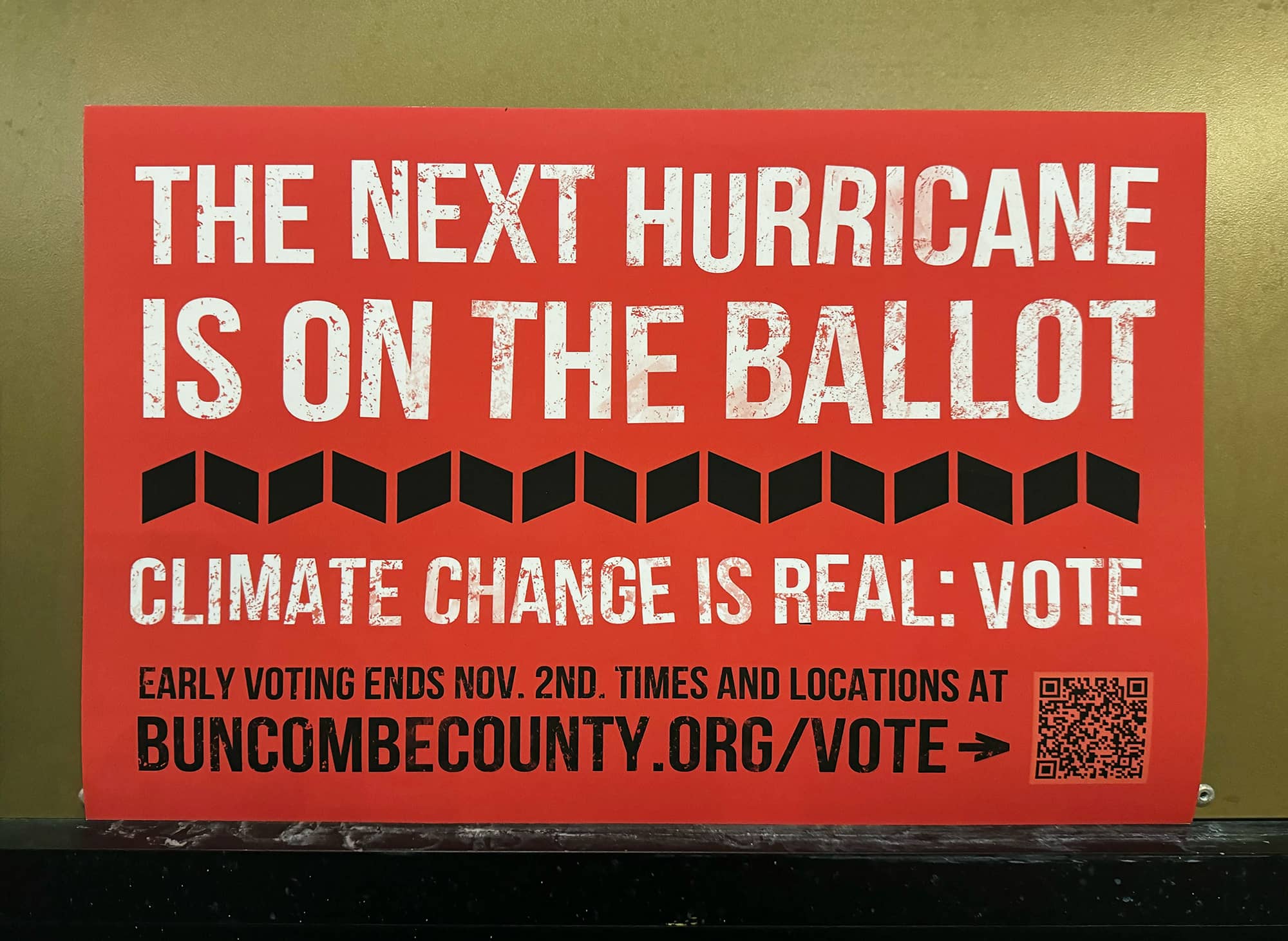
Robert Lund, a home remodeler in his 50s, said he was initially concerned that the hurricane would affect his ability to vote, but he soon received information about this new polling location from the county. But like Miller, one thing the storm didn’t change was Lund’s politics. “The last four years have been brutal for small business,” he said on his way into the library. “You come out of the grocery store with a couple bags and it costs you $140 and you’re going, ‘What did I get? I got taken is what I got.’” Lund said he was going to vote for Donald Trump.
Joining me out in the field today are my colleagues Katie Myers, Grist’s reporter embedded at Blue Ridge Public Radio in western North Carolina, and Ayurella Horn-Muller, who is reporting from Florida in communities devastated by both Helene and Hurricane Milton. Check back with Grist later today for our Election Day dispatches on how voters are feeling post-hurricane and the hurdles they’ve faced while trying to vote in the wake of a disaster.
Hi everyone, this is Jake. I’m on the opposite side of the country from Zoya, in California’s agriculture-rich Central Valley, but extreme weather is affecting a critical election on this coast as well. This morning at Grist, I profiled David Valadao, a longtime congressman representing California’s 22nd District and one of the most vulnerable Republicans in the House of Representatives, where the GOP has a razor-thin margin of control. Valadao is a former dairy farmer who has staked his political career on support for policies that provide more water for the agricultural industry — even when that means dismissing environmental rules. Valadao’s district has suffered historic drought in the decade since he entered Congress, and local farmers are once again staunchly supporting him this election cycle.
“Whoever’s perceived as being more likely to protect agriculture, or secure existing water deliveries and identify new ones, is going to be rewarded at the ballot box.”
—Tal Eslick, political consultant and former staffer to David Valadao
But the Central Valley is also home to numerous rural communities that don’t have reliable access to clean drinking water, and groups supporting his Democratic opponent, Rudy Salas, are trying to rally these low-income Hispanic communities to vote Valadao out. They’ve knocked on tens of thousands of doors in a district that elected Valadao by just over 3,000 votes last time around. The complex tangle of California water politics rarely makes national headlines, but this year it could decide who ends up in control of Congress.
Read my full story on Valadao here.
Are climate voters showing up?: The presidential election will likely come down to a few thousand votes in critical battleground states like Georgia. Our Grist colleagues Kate Yoder and Sachi Kitajima Mulkey look at the up-to-the-wire effort by advocacy groups and campaign volunteers to contact registered voters who care about climate change but seldom show up at the polls, urging them to cast their ballots this week.  Read more
Read more
Big downballot energy races: Just 200 public officials have outsize control over the fate of the nation’s clean energy transition — and many of them are on your ballot this November. Grist reporters Emily Jones and Gautama Mehta present a rundown on the role that state public service commissions play in regulating utilities, and the critical political races voters are deciding this year that could affect clean power deployment. Read more
Read more
What the election means for plastic: The United States is one of the world’s top producers of plastic, and the next president could play a make-or-break role in addressing this crisis, according to my Grist colleague Joseph Winters. It will be up to the next administration to decide whether to push for limits on plastic production, as Biden promised to do, or to renege on that commitment and let the industry produce as much as it wants. Read more
Read more
Rafael approaches: A tropical storm system called Rafael is forming in the Caribbean Sea and may become a hurricane by later today, Election Day. The storm won’t disrupt the voting process, but it will likely make landfall somewhere around Louisiana this weekend, presenting the lame-duck Biden administration with yet another disaster challenge. Read more
Read more
Fury over floods in Spain: Protestors hurled mud at the king and queen of Spain over the weekend during their royal visit to the site of unprecedented flooding in the Valencia region. The disaster killed more than 200 people and sparked outrage from residents, who accused the government of waiting too long to send out emergency alerts. Read more
Read more
This story was originally published by Grist with the headline Election Day in the disaster zone on Nov 5, 2024.
This content originally appeared on Grist and was authored by Zoya Teirstein.
This post was originally published on Radio Free.
This content originally appeared on Radio Free Europe/Radio Liberty and was authored by Radio Free Europe/Radio Liberty.
This post was originally published on Radio Free.
North Korean state media has made no mention of Tuesday’s U.S. presidential election but that hasn’t stopped residents – particularly traders and executives – from learning about it and taking an interest, according to sources in the country.
While official media outlets, including the Rodong Sinmun, report news from around the world, they regularly omit information about U.S. politics.
But three sources in North Korea’s North Hamgyong province told RFA Korean that some residents had heard about the election through foreign radio broadcasts or other means, and were “very curious about it.”
A corporate administrative executive in his 40s who, like others interviewed for this report, spoke on condition of anonymity due to security concerns, said he had learned about the U.S. election “through foreign radio about a month ago.”
“[Then,] a few days ago, a close friend told me that there will be a U.S. presidential election in early November, and that former President (Donald) Trump and the current vice president, a black woman, were competing, which surprised me,” he said, referring to Kamala Harris.
The administrative executive said that for his friend to know that level of detail about the election, he “must be listening to foreign radio,” without specifying the broadcaster. Several foreign news organizations transmit radio programs into North Korea, including Radio Free Asia and Voice of America.
“Not only people who secretly listen to the radio, but also trade workers who frequently travel abroad, executives who attend political lectures, and executives who read ‘reference newspapers’ would generally know about the U.S. presidential election,” he said.
RELATED STORIES
North Korea orders wartime readiness during joint U.S.-South Korean military drills
North Korea brushes off any hope of better U.S. ties under Trump
Possible ICBM launch or nuclear test by North Korea close to U.S. presidential election
North Korea occasionally informs the general public about international situations, he said, noting that publications such as “reference newspapers and communications” are published separately by the official Korean Central News Agency, subject to approval by the government.
Many ordinary North Koreans are aware of Trump, who met for talks during his 2016-2020 presidency with the country’s supreme leader, Kim Jong Un.
“There are many ordinary citizens who are curious about the international situation and the United States,” he said. “This is because they know that the United States is the wealthiest and most militarily powerful superpower on Earth and that its role is crucial in adopting U.N. sanctions resolutions and designating state sponsors of terrorism.”
The administrative executive said that details about what sanctions are imposed on North Korea by the U.S. are published in periodicals criticizing Washington, including a book called “Common Sense for Journalists,” which anyone can read.
Views were mixed on whether North Korea would fare better if Trump, a Republican, or Harris, a Democrat, were elected.
“People often say that Republicans are hardliners and Democrats are moderates,” he said. “On the other hand, some people say that having a Republican in power would be beneficial to us as in the past economic sanctions and other restrictions were often eased when Republicans were in charge.”
Split on expected impact
Another source from North Hamgyong‘s Hoeryong city, who also declined to be named, told RFA that while ordinary residents who are struggling to earn a living don‘t know much about the U.S. presidential election and aren’t interested in international affairs, “it seems that there are still quite a few people who know about [the election].”
“At a drinking party with four [close] friends there was talk that Trump, who sat down with Kim Jong Un for talks, was running in the U.S. presidential election again,” said the man in his 40s.
“Only one of the four friends was unaware of the election,” he said. “I think they found out about it through foreign radio, people who went abroad to earn foreign currency, or Chinese people I have connections with.”
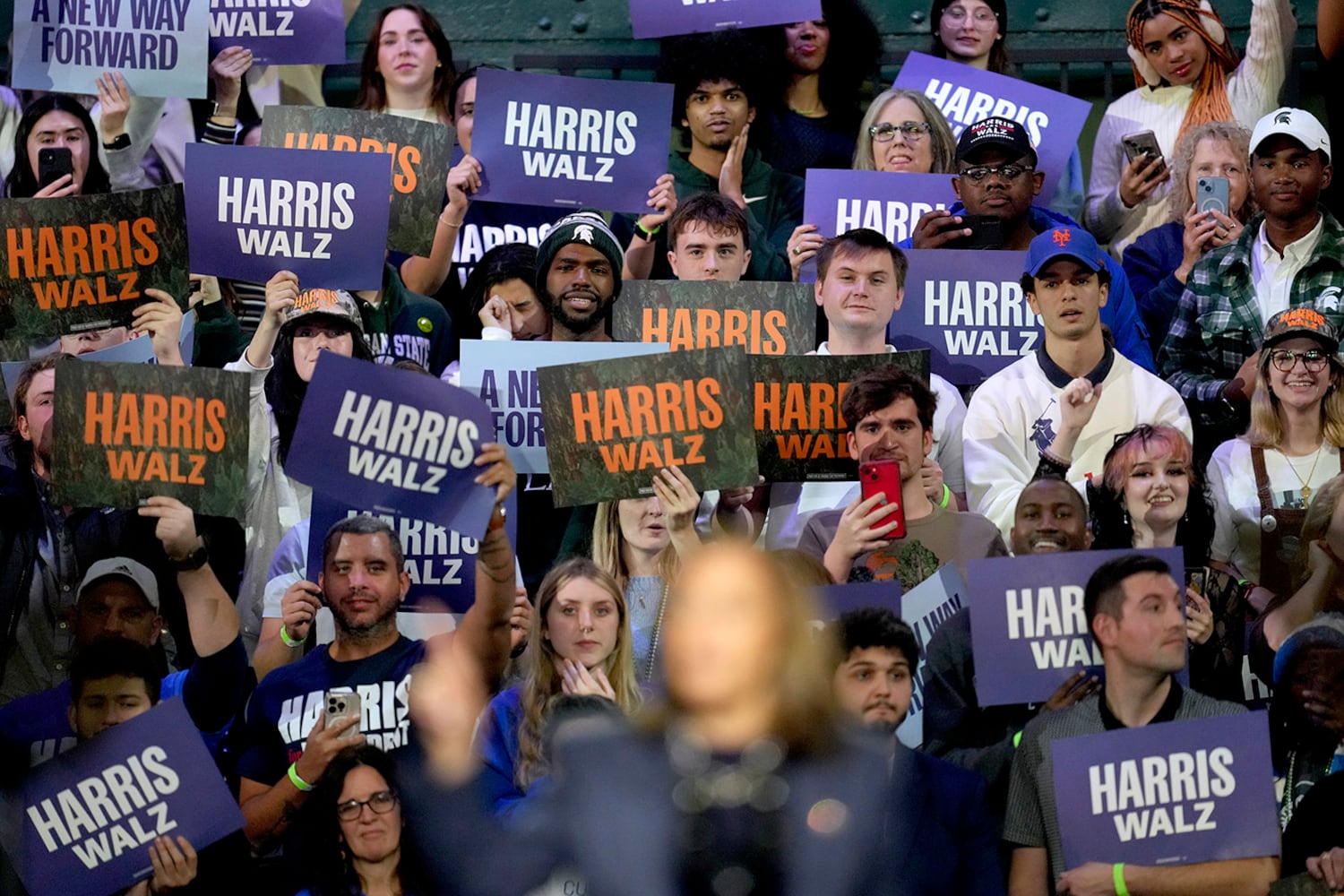
The source said that he and his friends were split on whether North Korea would benefit most from Democrats remaining in power or Trump winning the presidency, as he had met with Kim during his prior term.
He added that while in the past American elections were occasionally covered in the newspaper, “after the failure of the North Korea-U.S. Summit, there has been no such content and only articles criticizing the U.S. have been published.”
“People are smart these days and know that, contrary to what the authorities claim, it is not the United States’ fault that we are poor,” he said, “I hope that Kim Jong Un improves his relationship with the United States, eases tensions, and frees himself from economic sanctions so that the people can live with confidence.”
Traders, economists take note
The biggest public concern in North Korea, which is suffering from chronic food shortages, is economic recovery, said an official from North Hamgyong.
He said the U.S. election had become a “hot topic” for representatives of the country’s national economic and trade institutions because of its implications for the global economy.
“It’s because we think that [North Korea’s] economic situation will also change depending on who is elected as the next U.S. president,” he said.
But regular citizens are “consistently indifferent” about the U.S. political process, believing that the election will have little impact on sanctions.
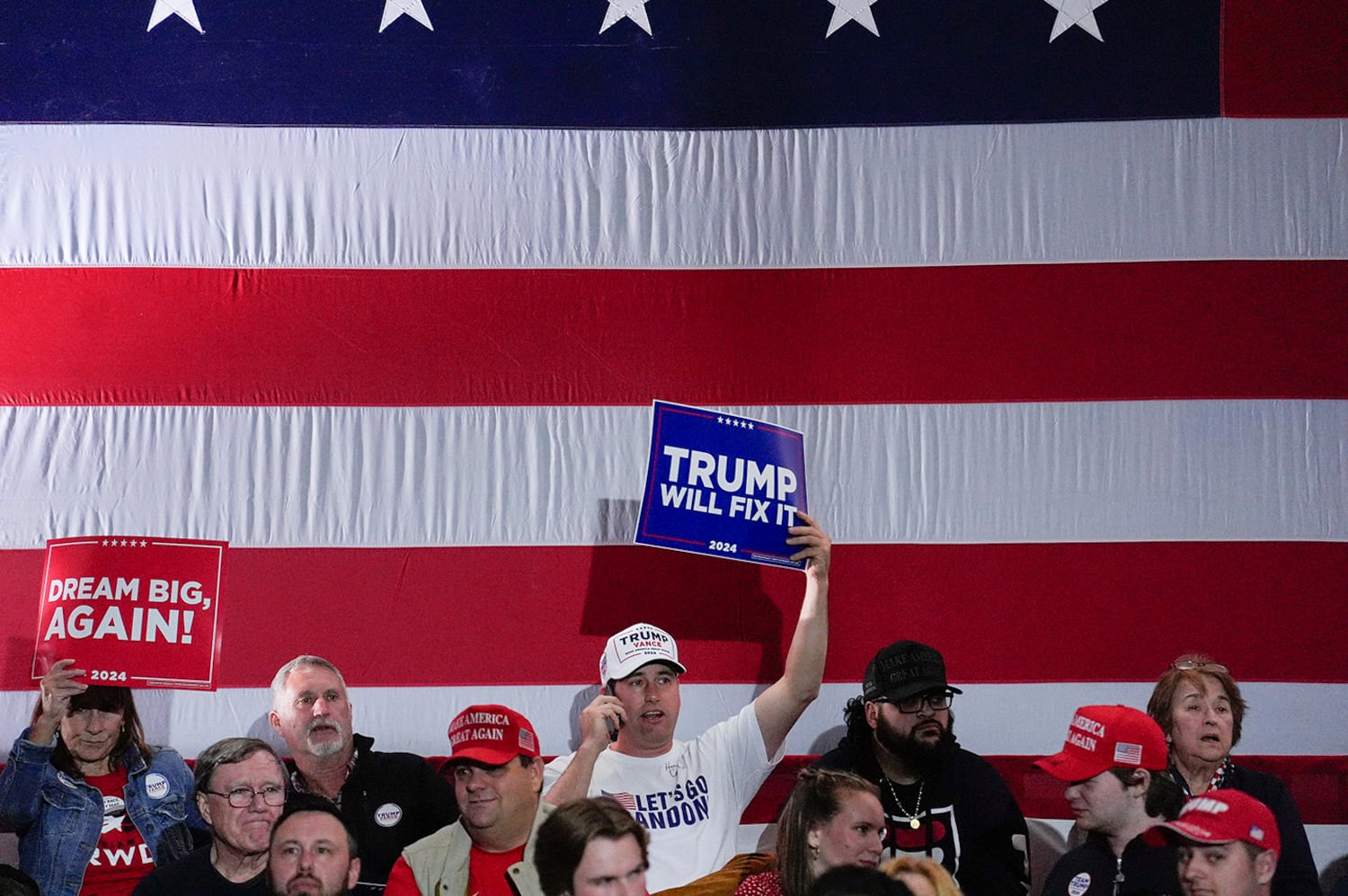
Meanwhile, “the party has repeatedly spread negative propaganda against former U.S. President Donald Trump to the public … because no results were achieved through the North Korea–United States Singapore summit in June 2018 and the Vietnam Summit held in February 2019,” he said.
Another official in North Pyongan province told RFA that trade organizations and economists are “very interested” in the election because it could drive fluctuations in prices and the global economy, which affect life in North Korea.
“Those who are involved in large-scale businesses or are affiliated with national trade institutions have a slight hope that the domestic economy will recover through this U.S. presidential election,” he said.
But the average citizen has little interest, he said, “because their lives have never improved, regardless of who is president.”
Translated by Claire S. Lee. Edited by Joshua Lipes and Malcolm Foster.
This content originally appeared on Radio Free Asia and was authored by Changgyu Ahn and Jieun Kim for RFA Korean.
This content originally appeared on The Real News Network and was authored by The Real News Network.
This post was originally published on Radio Free.
This content originally appeared on ProPublica and was authored by ProPublica.
This post was originally published on Radio Free.
Ralph welcomes Mark Dimondstein, president of the American Postal Workers Union. They’ll discuss the crucial role that the Postal Service plays in our democratic process, and how organized labor is impacting this year’s elections. Then, Ralph is joined by journalist James Bamford to talk about his latest article in The Nation: “Israel Is Killing Whole Families in Gaza—With Weapons Made in America.” Plus, how candidates’ positions on Israel may win or lose them voters on Election Day.
Mark Dimondstein is the President of the American Postal Workers Union. Since 2013 when Mr. Dimondstein was elected, he has turned the APWU into a fighting activist organization. Mr. Dimondstein advocates for the rights of postal workers as well as the right of the American people to a vibrant public Postal Service. The American Postal Workers Union supports Medicare for All and belongs to the Labor Campaign for Single Payer. The APWU believes in paying a living wage and providing benefits to all workers.
We have about 200,000 members. And we definitely represent people throughout the entire political spectrum and throughout the whole country. So we represent people from right to left, left to right, everybody in between, and we represent people from the most rural outpost in the country to the urban centers. So first, the way we handle it is we don’t try to tell people how they should think and how they should vote. We’re all adults, we vote for what we think is in our best interest as workers, as family members, as community members, as citizens and so on. So we don’t try to dictate to our members how to vote, but we do have a responsibility to lead…So I think leadership has a responsibility to educate our members, to activate our members, and to get our members to be involved in the political electoral process.
Mark Dimondstein
I’m a proud Jewish American. Jewish Americans should be the first to say “never again” when it comes to genocide, when it comes to ethnic cleansing, and when it comes to war crime. And we’re not going to solve all the problems of the Middle East and the complicated history of the Middle East on this radio show. But let’s at least be clear that the crimes committed against the Jewish people should never be allowed to be committed against anybody else—no matter who’s doing it.
Mark Dimondstein
Kamala Harris sent her two closest advisors to Wall Street about a month ago to get advice on her economic and tax policies and not connecting with the Citizens for Tax Justice, which has a progressive proposal. She doesn’t connect with citizen groups. She goes around campaigning with Liz Cheney…It’s quite amazing that the most popular incumbent elected politician in America today is Bernie Sanders…And she’s ignoring Bernie Sanders and going into one state after another with people like Liz Cheney.
Ralph Nader
Whatever happens next Tuesday, our work isn’t done. The divisions that have been created by white supremacy, by this anti-immigrant fervor out here—these things aren’t going away. Issues that divide workers instead of unite workers—the growing bigotry, the attack on women’s rights to reproductive freedom and health, the attacks on voting rights—these are issues that are going to be here with whoever wins the election. So the working people and the trade union movement have a lot of work to do, whatever the outcome.
Mark Dimondstein
James Bamford is a best-selling author, Emmy-nominated filmmaker for PBS, award-winning investigative producer for ABC News, and winner of the National Magazine Award for Reporting for his writing in Rolling Stone on the war in Iraq. He is the author of several books, including Spyfail: Foreign Spies, Moles, Saboteurs, and the Collapse of America’s Counterintelligence.
The reason I wrote [my article] was because people read about the bombs blowing up schools and refugee camps and hospitals and killing scores and scores, hundreds, thousands of people… But few people realized that it’s middle America, largely, that’s building the bombs, sending the bombs, and the American taxpayers are paying for the bombs. All the Israelis are doing is dropping the bombs.
James Bamford
I think the only way is international pressure. I wrote about this in my last book, that the only thing that you can ever do to affect Israel is to have an international boycott sanction. We have to treat it like the worst country on earth. That’s what happened with South Africa. That’s what stopped apartheid—once they couldn’t buy anything.
James Bamford
RECOGNIZING TIME-PRESSURED HEADLINE WRITERS’ CONTRIBUTIONS TO READERS
In Case You Haven’t Heard with Francesco DeSantis
News 10/30/24
1. A crisis is unfolding at the Washington Post following billionaire owner Jeff Bezos’ decision to block the paper’s planned endorsement of Kamala Harris. In a statement signed by 21 opinion columnists at the Post, they write “The…decision not to make an endorsement in the presidential campaign is a terrible mistake.” Signatories include Karen Attiah, E.J. Dionne, and Dana Milbank among many others. Since the publication of that statement, two opinion writers have resigned: David Hoffman, who has written for the Post since 1982 and was awarded a Pulitzer Prize just last week, as well as technology columnist Molly Roberts. Editor-at-large Robert Kagan also resigned his position at the paper. This from Semafor. Responding to the outcry, Bezos himself published an op-ed in the paper arguing that Americans see the news media as too politicized already and an official endorsement would merely make matters worse. As of October 29th, over 200,000 Washington Post readers, nearly 10% of the total readership, have canceled their subscriptions, per NPR.
2. Like the Washington Post, the LA Times also opted not to endorse Kamala Harris. Similar backlash followed, with the New York Times reporting “Thousands of readers canceled subscriptions. Three members of the editorial board resigned. Nearly 200 staff members signed an open letter to management demanding an explanation, complaining that the decision this close to the election had undermined the news organization’s trust with readers.” Nika Soon-Shiong, the activist daughter of LA Times owner Patrick Soon-Shiong, publicly stated “Our family made the joint decision not to endorse a Presidential candidate. This was the first and only time I have been involved in the process…As a citizen of a country openly financing genocide, and as a family that experienced South African Apartheid, the endorsement was an opportunity to repudiate justifications for the widespread targeting of journalists and ongoing war on children.” Per Vanity Fair however, her father disputes this narrative, saying “Nika speaks in her own personal capacity regarding her opinion…She does not have any role at The L.A. Times, nor does she participate in any decision or discussion with the editorial board, as has been made clear many times.” The murkiness of these circumstances has left readers with many questions that likely will not be answered until well after the election.
3. According to Slate, “Donald Trump told a crowd of supporters that he spoke with Israeli Prime Minister Benjamin Netanyahu [last] Saturday…According to Trump, the Israeli leader said he disregarded President Joe Biden’s warning to keep troops out of Rafah in southern Gaza.” In other words, Trump is conducting foreign policy independent of the sitting president, a flagrant violation of the Logan Act and the Constitution itself. This collusion between Trump and Netanyahu is reminiscent of the Nixon campaign’s collusion with the South Vietnamese to prolong the Vietnam War and thereby undermine the Hubert Humphrey campaign and similarly, the Reagan campaign’s collusion with Iran to prolong the hostage crisis. Yet again however, it seems unlikely that there will be any consequences to this open criminal activity.
4. Reuters reports that on Monday, Israel formally banned the United Nations Palestinian refugee agency from operating inside Israel. UNICEF spokesperson James Elder, who has worked extensively in Gaza since this campaign of slaughter began is quoted saying “If UNRWA is unable to operate, it’ll likely see the collapse of the humanitarian system in Gaza…So a decision such as this suddenly means that a new way has been found to kill children.” Reuters reports “over 13,300 children whose identities have been confirmed have been killed” in Gaza, while “Many more are believed to have died from diseases due to a collapsing medical system and food and water shortages.”
5. The Muslim Mirror reports “In a landmark diplomatic move, Claudia Sheinbaum, the newly elected President of Mexico and the country’s first Jewish head of state, officially recognized the State of Palestine.” Sheinbaum is quoted saying “Today, Mexico reaffirms its commitment to human rights and justice for all. Recognizing Palestine is a step toward peace and a signal to the international community that the Palestinian people deserve dignity, statehood, and the right to self-determination.” Neither the United States nor Canada recognize the State of Palestine.
6. Over 20,000 workers have lost their lives working on Crown Prince Mohammad Bin Salman’s Saudi Vision 2030 project, per the Hindustan Times. These workers, almost exclusively migrants, say they feel like “trapped slaves” and “beggars,” and allege widespread exploitation including “unpaid wages, illegal working hours and human rights abuses.” While rumors of the workers mistreatment has been circulating for years now, a new ITV documentary has brought more attention to the issue in recent days. The deeply suspect NEOM mega-city project alone, which is just one aspect of Saudi Vision 2030, is expected to cost at least $500 billion.
7. BRICS, the loose multi-polar alliance of countries forming an alternative economic bloc to offset the United States, recently concluded their latest summit. Per Democracy Now!, the alliance voted to accept 13 more countries to the bloc, including Algeria, Belarus, Bolivia, Cuba, Indonesia, Kazakhstan, Malaysia, Nigeria, Thailand, Turkey, Uganda, Uzbekistan and Vietnam. These were chosen from nearly three-dozen applicants. The outpouring of applications indicates a substantial appetite for an economic alternative to the United States throughout much of the world.
8. On October 22nd, Congressman Ro Khanna re-introduced the Stop Wall Street Landlords Act, intended to curb the trend of private equity gobbling up housing stock across the country. The bill was first introduced in 2022, but the crisis has only grown since then. According to NOTUS, “In the first half of 2024, one in four ‘low-priced’ homes were purchased by investors…In that same time, the percentage of Americans with a ‘high degree of concern’ about housing costs rose to 69%.” If passed, this bill would raise taxes on home acquisitions by private equity firms that hold over $100 million in assets and “bar government-supported lenders from backing new mortgages for such purchases.” Both presidential campaigns have made housing a major issue on the trail, though only the Kamala Harris campaign has offered viable policy to address the crisis.
9. E&E News reports Argus Insight, a conservative research firm is “collecting information that could be used to discredit officials involved in a multibillion-dollar climate lawsuit against fossil fuel companies.” The suit, filed last year in Oregon, accuses “Exxon Mobil, the American Petroleum Institute, McKinsey…and hundreds of other defendants of being responsible for a dayslong heat wave in 2021 that killed 69 people. Multnomah County, home to Portland, is seeking more than $51 billion to pay for damages from the tragedy and to prepare for future disasters.” It is unknown why exactly Argus is seeking this information, but experts speculate that they are “using the same tactics that the tobacco industry deployed against its critics decades ago.” Benjamin Franta, an Oxford professor of climate litigation, is quoted saying “The strategy is to ‘try to figure out who is helping to inform these cases and…discredit them in some way…If someone loses on the facts, they try to shoot the messenger.’”
10. Finally, the Popular Information Substack reports “On October 10…[Attorney General Merrick] Garland held a press conference and announced that TD Bank had illegally laundered over $670 million of drug money.” Deputy Secretary of the Treasury Wally Adeyemo added “Time and again, unlike its peers, TD Bank prioritized growth and profit over complying with the law.” Surely such a clear, textbook case of corporate criminality would result in criminal charges…except Garland and the DOJ brought no charges, instead settling for a Deferred Prosecution Agreement and a fine of $3 billion. Only two low-level employees were hit with criminal charges, despite clear evidence showing the involvement of high-level executives. Senator Elizabeth Warren said of the deal “This settlement lets bad bank executives off the hook for allowing TD Bank to be used as a criminal slush fund.”
This has been Francesco DeSantis, with In Case You Haven’t Heard.
This content originally appeared on Ralph Nader Radio Hour and was authored by Ralph Nader.
This post was originally published on Radio Free.
This content originally appeared on Laura Flanders & Friends and was authored by Laura Flanders & Friends.
This post was originally published on Radio Free.
This content originally appeared on Democracy Now! and was authored by Democracy Now!.
This post was originally published on Radio Free.
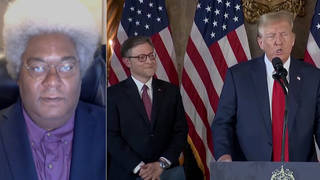
With just days to go before the November 5 presidential election, fears are growing that Republicans intend to interfere with the official results in order to install Donald Trump as president. At Sunday’s Madison Square Garden rally, Trump said he had a “little secret” with House Speaker Mike Johnson that would have a “big impact” on the outcome, though neither he nor Johnson elaborated on what that entailed. Elie Mystal, the justice correspondent for The Nation, says the secret is almost certainly a plan to force a contingent election, whereby no candidate wins a majority of the Electoral College and the president is instead chosen by the House of Representatives, where Republicans hold a slim majority. Mystal notes that even if Democrats challenge such an outcome, the case would still end up before a Supreme Court with a conservative supermajority that is likely to side with Trump.
This content originally appeared on Democracy Now! and was authored by Democracy Now!.
This post was originally published on Radio Free.
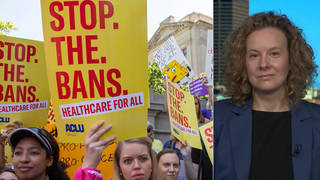
Kamala Harris is blasting Donald Trump for vowing to protect women whether they “like it or not” at the same time he is calling for Republican Liz Cheney to be shot in the face. We get response from The Nation's abortion access correspondent Amy Littlefield and talk about 10 states with abortion rights on the ballot, including Arizona, Nevada, Florida, South Dakota and Missouri. Trump's remarks are a “succinct and clear definition of patriarchy,” says Littlefield. She argues the 2024 election will be decided in large part by white women and whether they will vote for abortion rights. Trump is “laying out the bargain that white patriarchy has offered for white women in this country,” says Littlefield. “He is saying, 'White women, we will protect you from Brown and Black men.'”
This content originally appeared on Democracy Now! and was authored by Democracy Now!.
This post was originally published on Radio Free.
Queensland’s new Premier David Crisafulli has appointed a new Minister for Customer Services and Open Data after scrapping the former government’s Digital Services portfolio. Steve Minnikin was sworn in as Minister for Customer Services and Open Data and Minister for Small and Family Business on Friday as part of Mr Crisafulli’s 19-member ministerial Cabinet. He replaces former…
The post Gig Guide: Qld gets a Customer Service minister appeared first on InnovationAus.com.
This post was originally published on InnovationAus.com.
The November 2024 U.S. presidential election will take place after years of an increasingly polarized political climate in the country. This election comes after two previous contentious presidential election cycles, amid high levels of distrust in the media and a recent history of journalists being arrested, assaulted, and attacked in-person and online, including at protests.
As CPJ’s October 2024 special report on press freedom in the U.S. determined, the safety of journalists is at risk throughout the country with members of the media facing violence, online harassment, legal challenges, and attacks by police.
The January 6, 2021 attack on the U.S. Capitol highlights the potential for violence during mass gatherings, and the risks journalists face while covering them. Since the beginning of 2020, the U.S. Press Freedom Tracker has documented more than 800 attacks on journalists while covering such events. The possibility of similar press freedom violations in the wake of the 2024 U.S. presidential election remains a risk for journalists reporting the news.
In response, since the start of 2024, CPJ’s Emergencies Team has trained more than 700 journalists on how to stay safe while covering the upcoming U.S. presidential election. (See CPJ’s YouTube playlist for Election Safety Summer training videos, among the many journalist safety training sessions CPJ provided in 2024.)
Given the recent history of danger facing journalists covering political protests and unrest across the U.S., much of this training has been focused on how to safely report on — and during — protests. Digital safety, and how to protect yourself and your colleagues online, is another key training topic. The frequency and intensity of protests in the United States have escalated in recent years, creating a challenging environment for journalists.
Based on questions asked by journalists during this year’s safety training sessions, CPJ has outlined the key physical and digital safety issues journalists and their editors need to address to safely cover the upcoming U.S. election.
In general, best practices are as follows:
For more information, see CPJ’s guide on personal protective equipment (PPE).
For more information, see CPJ’s videos covering how to respond if a demonstration escalates and how to deal with teargas being used.

Journalists have the right to cover protests, but arrests do occur and can be an intimidating experience.
If stopped, identify yourself as a journalist and, if possible, record the interaction. While police can search you and sometimes will search personal items, they generally need a warrant to access cell phones or other recording devices.
Key points:
Learn more by reading CPJ’s guide to legal rights in the U.S.
Journalists covering protests are sometimes doxxed after the event, when people who attended the mass gathering post their private information online. Journalists who cover politics or other high-risk beats also risk being the target of online harassment and targeted harassment campaigns.
Before attending a protest or taking on a high-risk assignment, take the following steps:
For more information see CPJ’s resources on online abuse, and consult the Coalition Against Online Violence’s election resources.
This content originally appeared on Committee to Protect Journalists and was authored by Committee to Protect Journalists.
This post was originally published on Radio Free.
This content originally appeared on Democracy Now! and was authored by Democracy Now!.
This post was originally published on Radio Free.
This content originally appeared on Democracy Now! and was authored by Democracy Now!.
This post was originally published on Radio Free.
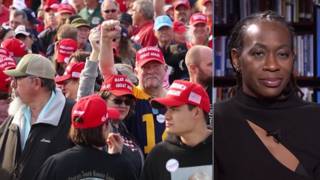
We speak with former Ohio state senator and Bernie Sanders presidential campaign staffer Nina Turner about how the 2024 election has left her and many voters “frustrated” and “exhausted.” While she is not endorsing a candidate, she denounces the white supremacist rhetoric of the Trump campaign, which she notes is “as American as apple pie.” Turner pushes back on comparisons of the Trump movement to the rise of Nazi Germany, which she argues threaten to whitewash the United States’ own anti-democratic history. “The unfulfilled promises of this country, the undealt-with anti-Blackness and other types of racism and bigotry have not been dealt with sufficiently,” she explains. “It is us, and we need to deal with it and not push it off on some other nation.”
This content originally appeared on Democracy Now! and was authored by Democracy Now!.
This post was originally published on Radio Free.
This content originally appeared on Radio Free Asia and was authored by Radio Free Asia.
This post was originally published on Radio Free.